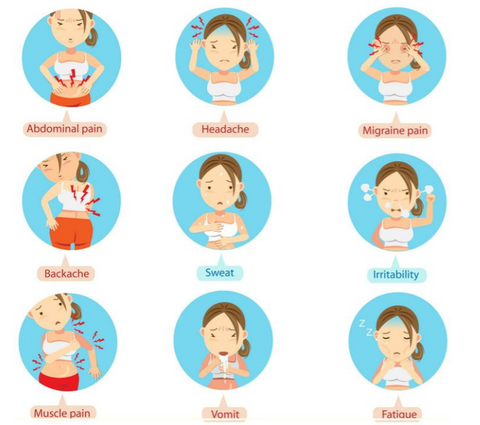What is Premenstrual Syndrome (PMS)?

Do you have Premenstrual Syndrome ?
Premenstrual Syndrome (PMS) is a common condition that affects more than 90% of all menstruating women, especially women aged 25-45. With some common symptoms include emotional, physical and behavioral changes during or before certain days of menstrual cycle. The cause of PMS is still unknown, but many researchers believe that it’s related to the change in both sex hormone and serotonin levels at the beginning of the menstrual cycle while serotonin is a chemical nerve cells produce. Estrogen and progesterone increase during certain times of the month and an increase in these hormones can cause mood swings, anxiety, and irritability.

Why do premenstrual symptoms occur?
Possible physiological factors:
- Hormone secretion imbalance
- Serotonin level as chemical messengers imbalance
Possible psychological and social factors:
- Life pressures and personal character and attitude towards life are all related to PMS.
- Studies have found that there is an interactive relationship between mental and psychological factors and the severity of PMS, because mental factors can affect our hormones.
- The various roles and pressures that women play in today's society and families are also related to PMS. Women who have lower life pressures, are able to cope with various roles easily and have a sense of satisfaction have relatively low incidence or severity of PMS. On the contrary, when women conflict and appear dissatisfied with various roles, they suffer and the incidence and severity of pre-stress syndrome may increase relatively.
The common symptoms of PMS include:
- Abdominal bloating
- Abdominal pain
- Acne
- Sore breasts
- Constipation
- Diarrhea
- Depression
- Headaches
Tips to overcome the symptoms of PMS:

1. Increase the iron and zinc intake
Researchers at the University of Massachusetts at Amherst found that women with an iron intake of more than 20 milligrams a day had about a 35 percent lower risk of being diagnosed with PMS than women who had the lowest iron intake, about 10 mg a day. The study found some evidence that a zinc intake of more than 15 milligrams a day by zinc supplements was associated with a lower risk of PMS.
2. Load up on magnesium
Magnesium can ease the water retention such as green leafy vegetables, nuts, whole grains, and fortified cereals. If you know your diet is lacking, you can consider supplementing with a quality magnesium like Salus' liquid magnesium made of natural ingredients like fruits, vegetables and herbs.
3. Eat foods high in calcium e.g yoghurt, leafy green vegetables or consider Calcium supplement.
The results of the A double-blind randomized clinical trial study suggest that treatment with calcium supplements is an effective method for reducing mood disorders during PMS
4. Avoid trans fat and foods with high fat and sugar content such as deep fried foods and cookies
5. Limit salt intake, avoiding processed food, salty snacks and fast food to reduce the chance of physical bloating.
6. Cut down on caffeine and alcohol consumption which may disrupt sleep and affect sleeping quality.
7. Many women with PMS have been shown to be deficient in certain vitamins and minerals. Consider supplements like a multivitamin to reduce the onset and severity of emotional and physical PMS related symptoms.
8. Fill up on foods with high quality protein which are rich in an amino acid called tryptophan that the body uses to make serotonin such as fish, poultry, plant-based protein sources such as beans and tofu.

HAPPY WOMEN'S DAY!
References:
- Yonkers, K. A., O'Brien, P. M., & Eriksson, E. (2008). Premenstrual syndrome. Lancet (London, England), 371(9619), 1200–1210. https://doi.org/10.1016/S0140-6736(08)60527-9
- Iron and Zinc May Prevent PMS. (2013). Cari Nierenberg. Live Sciene https://www.livescience.com/27486-iron-zinc-premenstrual-syndrome.html
- Shobeiri, F., Araste, F. E., Ebrahimi, R., Jenabi, E., & Nazari, M. (2017). Effect of calcium on premenstrual syndrome: A double-blind randomized clinical trial. Obstetrics & gynecology science, 60(1), 100–105. https://doi.org/10.5468/ogs.2017.60.1.100
-
Related Tags:
Beauty
Detox
General Health
immunity
Keto
Lifestyle
Nutritional Tips
women






![Jomeis Fine Foods Turmeric Latte 120g [Keto-friendly]](http://foodforlifehk.com/cdn/shop/products/Jomeis_Fine_Foods_Turmeric_Latte_120g_74e08879-d5e7-4931-acc9-f2e6f58c10c1_{width}x.jpg?v=1640935570)
![Jomeis Fine Foods Minty Cacao Latte 120g [Keto-friendly]](http://foodforlifehk.com/cdn/shop/products/Jomeis_Fine_Foods_Minty_Cacao_Latte_120g_{width}x.jpg?v=1640935682)

![Jomeis Fine Foods Matcha Latte 100g [Keto-friendly]](http://foodforlifehk.com/cdn/shop/products/Jomeis_Fine_Foods_Matcha_Latte_100g_{width}x.jpg?v=1640935619)


